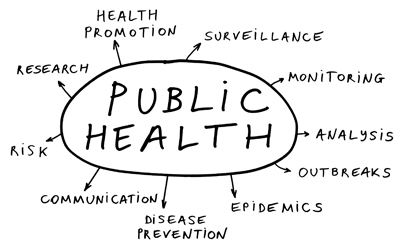Public Health: A Love Story

If someone had asked me what public health was 5 years ago, I would have shrugged and replied,'I don't know." Reflecting on my past educational and professional experiences, I can see how I transitioned from knowing nothing about public health to being completely immersed and obsessed with this wide, diverse, and multidisciplinary field. As I approached the end of my junior year of college, I knew I wanted to pursue a Master's degree in Public Health. I began applying to schools and looking for positions or experiences in the field and that's where I discovered the National Health Corps Chicago. I was determined to apply and get this AmeriCorps position. It sounded like everything I wanted and more. After finding out I was accepted to both DePaul University's Masters of Public Health program and the National Health Corps Chicago I counted down the days until I graduated college and moved to Chicago.
When starting my position at NHC Chicago while taking graduate classes, I wasn't sure how I was going to handle these two commitments. However, I was surprised as the service term went on how much both of these experiences fueled my knowledge of public health. I was able to share experiences from service with my classmates as well as apply theory and concepts from class to projects at my host site. One of my favorite classes so far has been health behavior theory. In this class we learned about the different theories developed to aid in changing health behaviors, including the ecological model of health, the transtheoretical model of change, and the health belief model.
When educating patients about healthy eating habits, proper prenatal care, and safe sex practices I often found myself becoming frustrated with the lack of change in their behaviors. Patients verbalized that they knew and understood the risks of these unhealthy behaviors, yet they still wouldn't change. I didn't fully understand why they wouldn't implement change even if they had the knowledge to do so. Taking health behavior theory in graduate school opened my eyes to a variety of factors I had never previously considered. When studying these theories I immersed myself in the constructs and the many facets of behavior change. I will never forget the first lecture where my professor explained that most people already have the knowledge and understanding of the risks of certain behaviors, yet there are so many other factors that prevent them from changing, such as their socioeconomic status, mental health, physical health, and overall outlook on life. I had thought of some of these concepts before when discussing behavior change, but I was blind to the fact that these other factors played a much bigger role than I had imagined.
Through the information I've learned in graduate school and the experiences I've gained as a health educator I feel much more confident as the service term continues and I approach the last half of my time as a health educator. Both of these experiences have been invaluable, have provided me with so much insight, and have opened my eyes, ears, and mind to the many barriers faced by the patients I see. Public health is an integral part of my life and has taught me how to be more open, understanding, and realistic.

This post was written by NHC Chicago member Lacey Johnson.
Lacey serves as a Health Educator at Erie Family Health Center Teen Center.